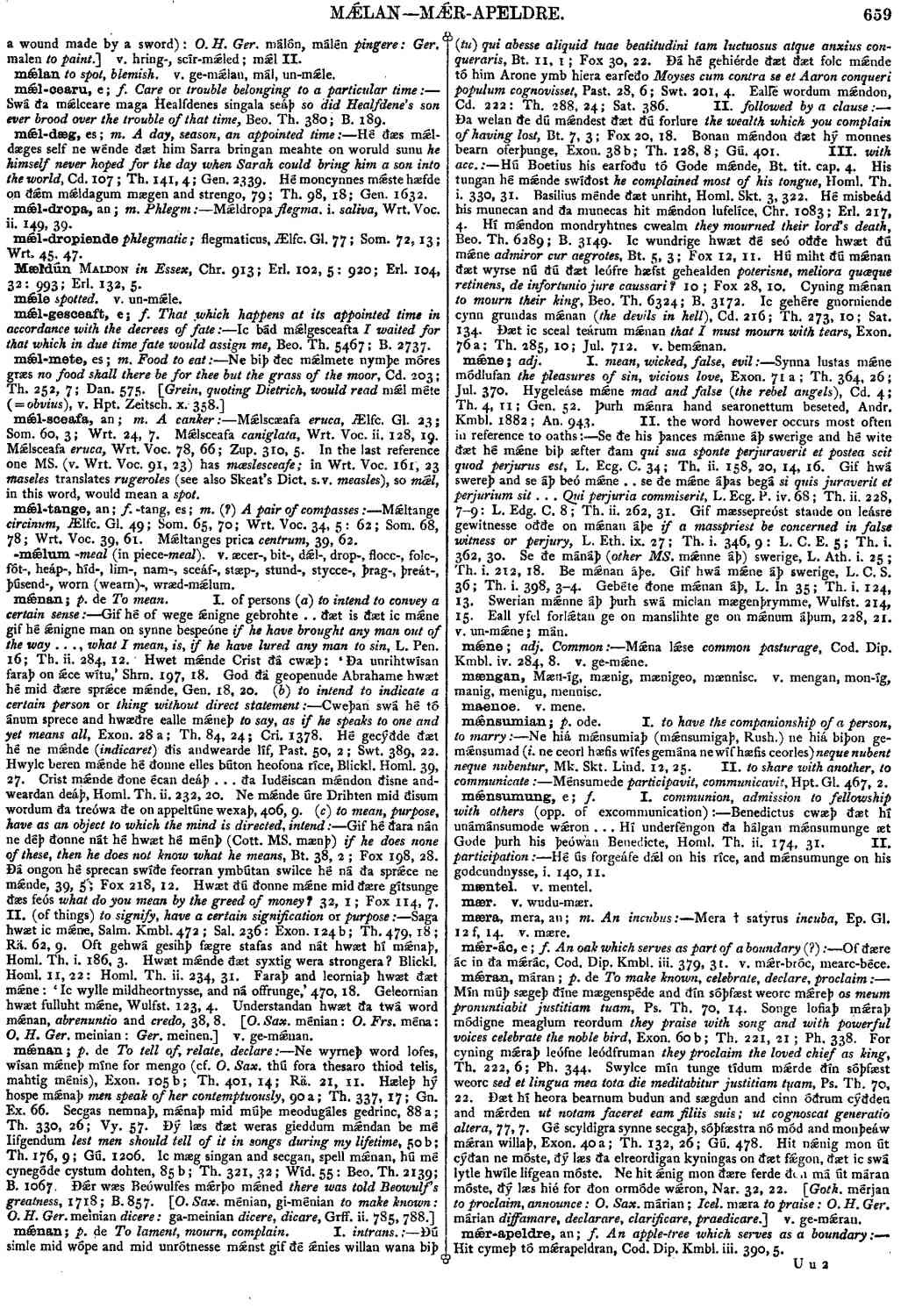mǽnan
- verb [ weak ]
-
Gif hé of wege ǽnigne gebrohte . . ðæt is ðæt ic mǽne gif hé ǽnigne man on synne bespeóne
if he have brought any man out of the way . . . , what I mean, is, if he have lured any man to sin,
- L. Pen. 16 ;
- Th. ii. 284, 12.
-
Hwet mǽnde Crist ðá cwæþ; 'Ða unrihtwísan faraþ on ǽce wítu,'
- Shrn. 197, 18.
-
God ðá geopenude Abrahame hwæt hé mid ðære sprǽce mǽnde.
- Gen. 18, 20.
-
Cweþan swá he tó ánum sprece and hwæðre ealle mǽneþ
to say, as if he speaks to one and yet means all.
- Exon. 283 ;
- Th. 84, 24 ;
- Cri. 1378.
-
Hé gecýðde ðæt hé ne mǽnde
(indicaret
)ðis andwearde lif,
- Past. 50, 2 ;
- Swt. 389, 22.
-
Hwylc beren mǽnde hé ðonne elles búton heofona ríce,
- Blickl. Homl. 39, 27.
-
Crist mǽnde ðone écan deáþ . . . ða Iudéiscan mǽndon ðisne and-weardan deáþ.
- Homl. Th. ii. 232, 20.
-
Ne mǽnde úre Drihten mid ðisum wordum ða treówa ðe on appeltúne wexaþ,
- 406, 9.
-
Gif hé ðara nán ne déþ ðonne nát hé hwæt hé ménþ (Cott. MS. mænþ)
if he does none of these, then he does not know what he means,
- Bt. 38, 2 ;
- Fox 198, 28.
-
Ðá ongon hé sprecan swíðe feorran ymbútan swilce hé ná ða sprǽce ne mǽnde,
- 39, 5 ;
- Fox 218, 12.
-
Hwæt ðú ðonne mǽne mid ðære gítsunge ðæs feós
what do you mean by the greed of money?
- 32, 1 ;
- Fox 114, 7.
-
Saga hwæt ic mǽne,
- Salm. Kmbl. 472 ;
- Sal. 236: Exon. 124 b ;
- Th. 479, 18 ;
- Rä. 62, 9.
-
Oft gehwá gesihþ fægre stafas and nát hwæt hí mǽnaþ,
- Homl. Th. i. 186, 3.
-
Hwæt mǽnde ðæt syxtig wera strongera?
- Blickl. Homl. 11, 22: Homl. Th. ii. 234, 31 .
-
Faraþ and leorníaþ hwæt ðæt mǽne: 'Ic wylle mildheortnysse, and ná offrunge,'
- 470, 18.
-
Geleornian hwæt fulluht mǽne.
- Wulfst. 123, 4.
-
Understandan hwæt ða twá word mǽnan,
abrenuntio and credo,
- 38, 8.
Bosworth, Joseph. “mǽnan.” In An Anglo-Saxon Dictionary Online, edited by Thomas Northcote Toller, Christ Sean, and Ondřej Tichy. Prague: Faculty of Arts, Charles University, 2014. https://bosworthtoller.com/22154.
Checked: 1